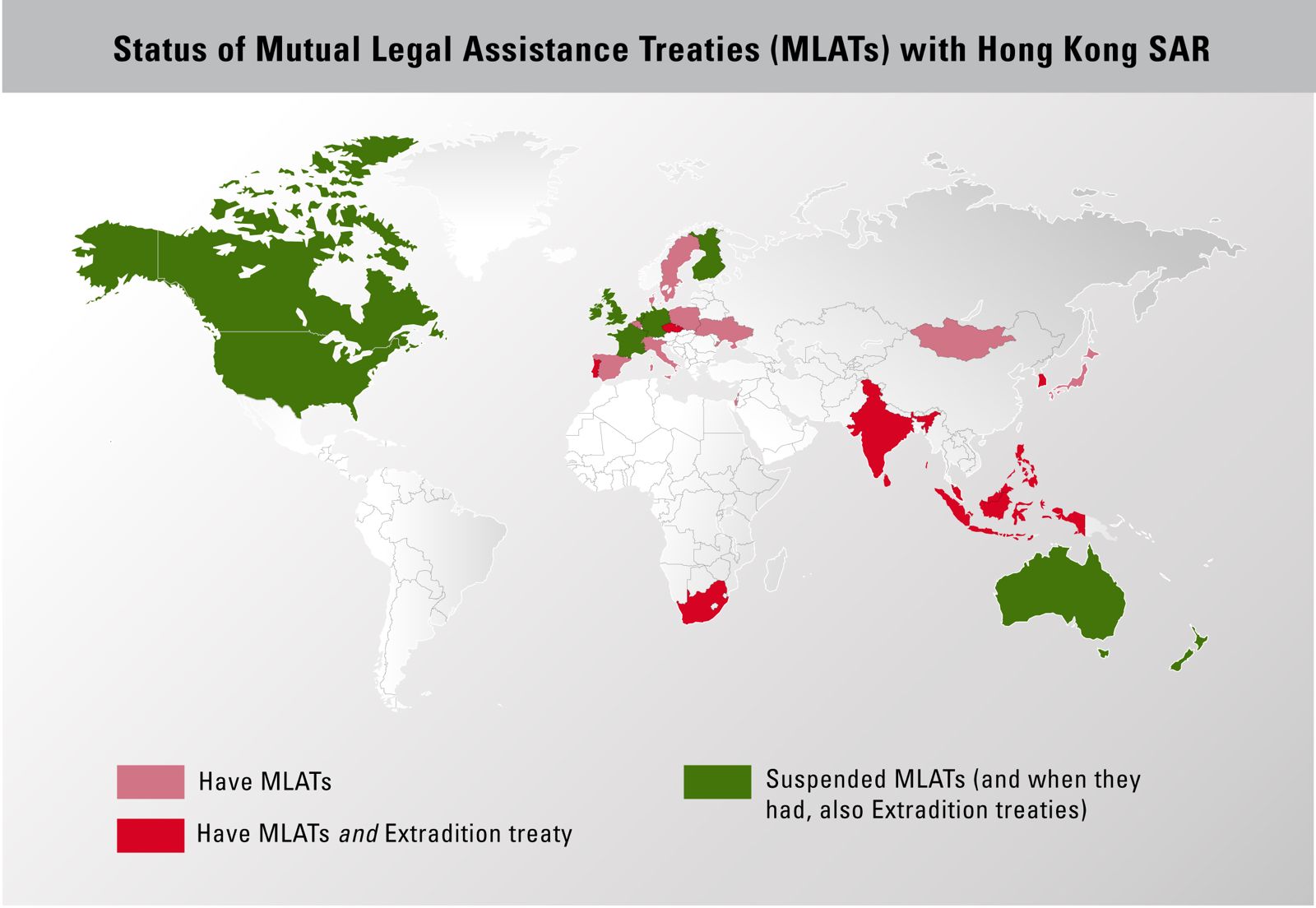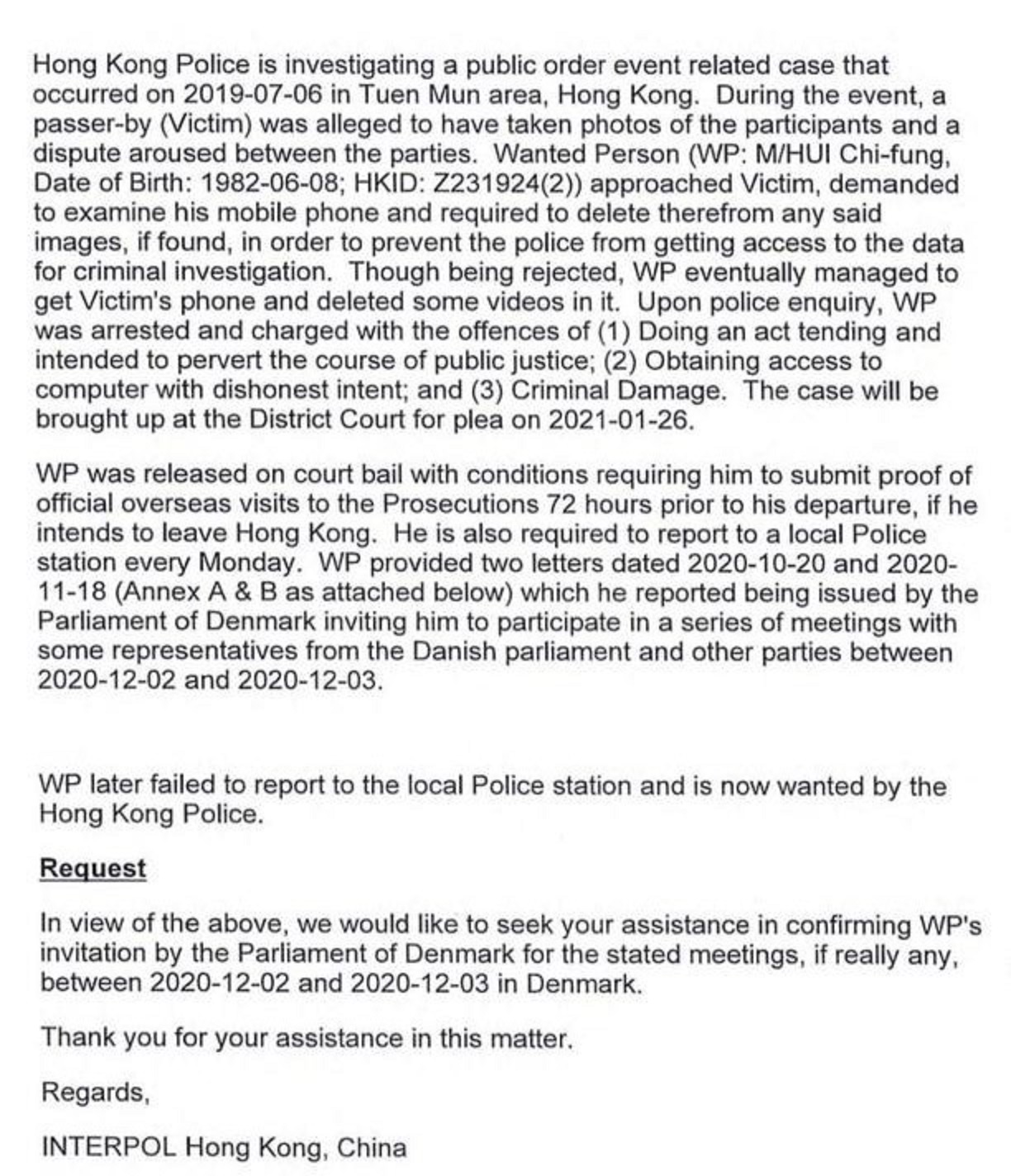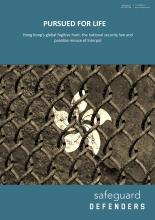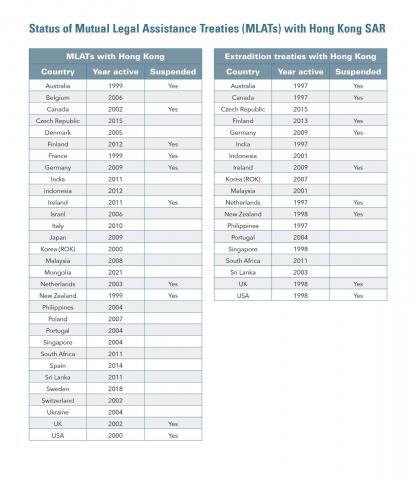Hong Kong Police challenges West to abandon MLATs and Extradition Treaties
Hong Kong authorities name four foreign citizens as "co-conspirators" in fabricated charges against Jimmy Lai. These latest escalatory moves against pro-democracy activists and human rights defenders overseas should urge democratic authorities to act in unison on their obligations to uphold and defend the fundamental freedoms of their communities, and stop the tacit legitimisation of the authoritarian rule by law the CCP seeks to impose beyond its borders. Targeted sanctions against those responsible for the imposition and implementation of the so-called National Security Law and the immediate suspension of bilateral extradition and mutual legal assistance treaties can no longer be postponed.
In December, the Hong Kong Police Force (HKPF) issued arrest warrants and 1 million HKD bounties on the heads of five Hong Kong democracy activists and human rights defenders: Joey Siu, Frances Hui, Simon Cheng, Johnny Fok and Tony Choi.
All of them are accused of having “continued to commit the offence[s] under the national security law that seriously endanger national security, including incitement to secession, incitement to subversion, and collusion with foreign country or external elements to endanger national security”.
The offences? The free exercise of fundamental human rights guaranteed under international treaties to which both Hong Kong and the country they currently reside in - or are a citizen of, as is the case for Joey Siu who is a U.S. citizen exercising her constitutional rights - are beholden.
The warrants and bounties follow those imposed on eight other exiled dissidents in July 2023: Nathan Law, Anna Kwok, Ted Hui, Dennis Kwok, Mung Siu-tat, Elmer Yuen, Finn Lau and Australian citizen Kevin Yam.
Today, we learn Hong Kong authorities named three foreign citizens – Inter-Parliamentary Alliance on China (IPAC) Executive Director Luke de Pulford, IPAC regional liaison and former Japanese MP Shiori Kanno, the driving force behind the Global Magnitsky targeted sanctions regime, Bill Browder - as “co-conspirators” in fabricated "collusion with foreign forces" charges against former Apple Daily editor and UK citizen Jimmy Lai under the so-called National Security Law. Former Apple Daily executive and US citizen Mark Simon is the fourth foreign national named as a co-conspirator to publish "seditious content".
The accusation? Once again, nothing but the exercise of their freedom of association and expression guaranteed under international treaties and the constitution and laws of the countries they are subject to: Japan, United Kingdom and United States of America.
While no known formal charges have been brought against the four at the time of writing, recent events once again demonstrate Hong Kong authorities have no qualms whatsoever using the unlawful provisions of extra-territoriality in the Beijing-imposed National Security Law (NSL) to attack freedom and democracy everywhere. If anything, the fact that so far the vast majority of democracies have imposed little to no effective cost on Hong Kong and PRC authorities for the imposition of the NSL and its effects, clearly encourages them to keep pushing the envelope.
This must end. The transnational repression of fundamental rights and freedoms with the aim of intimidating, discredit and silence – or worse - dissenting voices represent an unacceptable infringement of national sovereignty and the international rule of law. Lofty statements alone will not stop the CCP’s escalation of abusing any leverage and international instrument to incite fear into the hearts and minds of those advocating overseas.
In the face of the stark reality that no mainland or Hong Kong authority will respect its international legal obligations, decisive and coordinated action is needed to accompany the G7 Leaders’ call on China “not to conduct interference activities aimed at undermining the security and safety of our communities, the integrity of our democratic institutions and our economic prosperity”.
Targeted coordinated sanctions and visa restrictions on both mainland and Hong Kong authorities responsible for the imposition and implementation of the so-called National Security Law are long overdue. So is the suspension of the many still standing extradition and multi-lateral assistance treaties within the European Union.
In the EU Council conclusions on Hong Kong of 24 July 2020, the EU vowed to:
- Discuss at EU level the potential risks to EU citizens presented by the national security legislation;
- Monitor the extraterritorial effect of the national security legislation;
- Review the implications of the national security legislation on the operation of Member States’ extradition and other relevant agreements with Hong Kong.
Despite numerous European Parliament resolutions calling for the suspension of remaining Member States’ extradition treaties with the PRC and Hong Kong since, none of them have garnered the political courage to even discuss doing so, instead sheltering behind the judicial cover thankfully provided by the European Court of Human Rights in its landmark October 2022 Liu v. Poland sentence.
But a judicial cover cannot counter the rightful sense of fear that comes with the legal uncertainty of those that may be unlawfully targeted under the CCP’s sprawling extra-territorial provisions and abuse of international judicial and police cooperation mechanisms. Only a political response can counter the CCP’s gleeful narrative that the extradition treaties and other judicial cooperation mechanisms “demonstrate the international community’s trust in its judicial processes and institutions”.
How long will the European Union continue to provide support to this propaganda trope legitimizing what has been defined by the European Court of Human Rights as a general situation of violence?
At the moment, ten Member States still maintain active extradition treaties with the PRC. Two (Portugal and the Czech Republic) maintain them with Hong Kong. How many more abusive warrants, bounties and groundless charges will it take before actions follow the words of the 2020 EU Council conclusions and these treaties are suspended?
The same question goes for the lesser-known Mutual Legal Assistance Treaties (MLATs).
Mutual Legal Assistance Treaties regulate cooperation between police forces.
A mutual legal assistance treaty (MLAT) is an agreement between two or more countries for the purpose of gathering and exchanging information in an effort to enforce public or criminal laws. A mutual legal assistance request is commonly used to formally interrogate a suspect in a criminal case, when the suspect resides in a foreign country.
Such a request for information or help can be denied if the request would be contrary to the rule of law.
Prior to the British hand-over in 1997, Hong Kong SAR had MLATs with 31 countries. Since then, 10 of them have been suspended. The below map shows the current state of affairs and the 21 countries that still maintain their MLATs with Hong Kong, including several key EU member states. The table at the end of this article shows the detail of ratification and suspension status.

Belgium, Czech Republic, Denmark, Israel, Italy, Japan, Poland, Portugal, Republic of Korea, Spain, Sweden, Switzerland and Ukraine are the liberal democracies that have not moved to suspend, or even formally review, their MLATs with Hong Kong.
With a Japanese citizen now officially named as a “co-conspirator”, they and fellow democracies would do well to take note of Denmark’s recent endeavor with Hong Kong and Chinese authorities very recent attempt to use its MLAT.
Using INTERPOL channels, in December 2020 the PRC and Hong Kong authorities formally requested the Danish police help investigating Danish citizens accused of assisting bounty-hunted Ted Hui flee Hong Kong. At the time, those citizens were elected members of Denmark’s Parliament and IPAC co-chairs. As Safeguard Defenders reported earlier (following revelations in Denmark’s Politiken newspaper):
On December 9, 2020, Hong Kong and China, using Interpol channels, sent a request to the Danish police, based on the existing mutual legal assistance treaty (MLAT), asking for assistance in investigating whether two Danish elected members of parliament (Uffe Elbæk and Katarina Ammitzbøll) had helped former Hong Kong politician and pro-democracy leader Ted Hui flee Hong Kong.

The request was denied for running counter to the rule of law. But one has to ask: what if this had happened in a country such as Portugal which only too recently extradited an individual to the PRC (in violation of multiple international obligations, including the principle of non-refoulement)? What if the targeted individuals where not elected members of parliament? What if they were temporary Hong Kong asylum seekers?
 As the Hong Kong authorities insist on their vow that those charged in violation of the National Security Law will be “pursued for life”, it is a question Japan and fellow liberal democracies would do well to ask themselves sooner rather than later.
As the Hong Kong authorities insist on their vow that those charged in violation of the National Security Law will be “pursued for life”, it is a question Japan and fellow liberal democracies would do well to ask themselves sooner rather than later.
Only the urgent coordinated suspension of extradition and mutual legal assistance treaties is capable of sending the much-needed political signal that liberal democracies will not allow authoritarian state actors to undermine the security and safety of their communities and provide legal certainty to those that are or may become the target of such unlawful actions.
